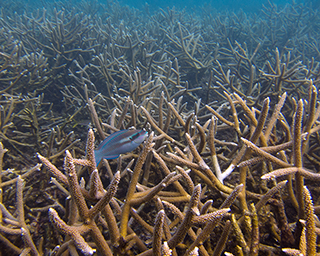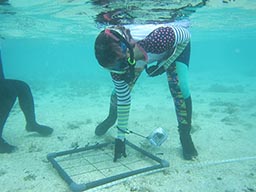- ABOUT US
- PROGRAM AREAS
- CONSERVATION APPROACH
- EDUCATION
- MULTIMEDIA
Climate, reefs and resilience Q&A

Managers, scientists, and communities are working at a local scale to give their coral reefs a fighting chance in the face of a changing climate.
In this online Q&A, Britt Parker, NOAA Coral Reef Conservation Program's climate coordinator, shares how applying resilience-based management techniques to reefs and reducing local stressors is helping reefs resist or recover from global-scale climate events.
Climate change is a global threat. What are some local solutions and strategies to address it?
Climate change is absolutely a global threat. The only way to really reduce its impact is through greenhouse gas reduction. Locally there's not much a manager can do in terms of cooling warm waters over reefs when there's a coral bleaching event, for instance.
However, just as humans tend to get sick when we are under stress, so do corals. So one of the things we can look at doing is reduce local stressors to coral reefs so that when they are exposed to things we don't have much control over, like a bleaching event, they have a better chance to recover. In this way the reefs are more resilient.
What is reef resilience?
When we talk about reef resilience, we are talking about the ability of a coral to resist bleaching and/or recover from an event. The NOAA Coral Reef Conservation Program focuses a lot on local threats that can reduce the resilience of reefs. Those include things like land-based sources of pollution, unsustainable fishing practices, and physical damage from anchors and vessel groundings. These are stressors that local managers are actively addressing.
How is NOAA working with its partners to assess and strengthen reef resilience?
Today we have a greater understanding of how to assess the relative potential resilience of reefs. We also have a better grasp on how to apply this information on the ground and in the water to boost reef resilience through targeted management actions.
The NOAA Coral Reef Conservation Program is working with partners globally to synthesize this information and provide guidance to reef managers - as well as data and information to use in assessments. The Nature Conservancy is one of our key partners in this effort. Additionally, we work with universities across the nation and around the globe to tackle key research questions about reef resilience.
The program also partners with management agencies, like the Great Barrier Reef Marine Park Authority in Australia. Scientists and managers at the Great Barrier Reef are already applying resilience-based management to reefs, so there is a lot we can learn from their experiences. It's also important that we work with partners to keep the global conversation about reef resilience alive and buzzing.
About Us

The NOAA Coral Reef Conservation Program was established in 2000 by the Coral Reef Conservation Act. Headquartered in Silver Spring, Maryland, the program is part of NOAA's Office for Coastal Management.

The Coral Reef Information System (CoRIS) is the program's information portal that provides access to NOAA coral reef data and products.
Work With US
U.S. Coral Reef Task Force
Funding Opportunities
Employment
Fellowship Program
Contracting Assistance
Graphic Identifier
Featured Stories Archive

Access the archive of featured stories here...
Feedback
Thank you for visiting NOAA’s Coral Reef Conservation Program online. Please take our website satisfaction survey. We welcome your ideas, comments, and feedback. Questions? Email coralreef@noaa.gov.
Stay Connected
Contact Us
NOAA’s Coral Reef Conservation Program
SSMC4, 10th Floor
1305 East West Highway
Silver Spring, MD 20910
coralreef@noaa.gov
